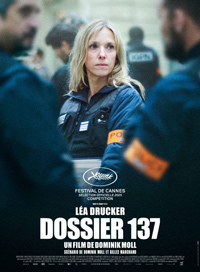Investigation of Citizens Above Suspicion: Moll Persists with Police Procedural
 Dominik Moll reunites with his usual collaborating scribe Gilles Marchand in Dossier 137, their third genre oriented title in a row following Only the Animals (2019) and their runaway hit The Night of the 12th (2022). Their latest, as the sobering title suggests, is pure police procedural utilizing a fictionalized scenario set during the Yellow Vest Protests in Paris, 2018-2020. A lead performance from Lea Drucker is the highlight in a film most surprising for how standard it feels.
Dominik Moll reunites with his usual collaborating scribe Gilles Marchand in Dossier 137, their third genre oriented title in a row following Only the Animals (2019) and their runaway hit The Night of the 12th (2022). Their latest, as the sobering title suggests, is pure police procedural utilizing a fictionalized scenario set during the Yellow Vest Protests in Paris, 2018-2020. A lead performance from Lea Drucker is the highlight in a film most surprising for how standard it feels.
Stephanie (Drucker) is an investigator for the IGPN, a sort of internal affairs unit specifically dealing with crimes allegedly committed by police officers. December of 2018 finds Stephanie overwhelmed with complaints due to the ongoing Yellow Vest Protests, which began as a well intentioned demonstration for workers’ rights but swiftly devolved, thanks in part to significant force utilized against non-violent protestors. When a mother appears in her office to file a complaint on behalf of her severely injured son, who was shot in the head with a LBD riot gun, Stephanie realizes she grew up in the same working class neighborhood as the affected family. Retracing the events of the BRI team responsible by piecing together CCTV footage, a surprise witness is located who filmed the whole incident, which is at odds with the statements given by the officers.

Godard was purported to have been working on a project dealing with the Yellow Vest Protests prior to his death, which likely would have been a much different sort of film. Moll attempts something a bit outside of his forte in Dossier 137, which is also a character driven potboiler but in the fine French tradition of social realism, mining the grey areas of culture and conscience. In many ways, it’s a film which feels more akin to the filmography of Stephane Brize, who might have cast either Vincent Lindon or Sandrine Kiberlain. But Moll utilizes the ever dependable Lea Drucker, who plays a similar type of role in Laura Wandel’s Adam’s Sake (2025), a professional woman who oversteps her bounds due to potential emotional bias (Claire Bodson, curiously also appears in Wandel’s film in a similar capacity).
The film’s painstaking process lends itself to the frustrating heights of helplessness in the third act, where blatant lies by guilty police officers are exposed but diminished due to various technicalities. Moll and Marchand aren’t relaying anything innately shocking or scandalous by today’s standards, but through the characterization of Stephanie the film guides us through her own simple but profound epiphany. Wouldn’t her own background as a police officer make her automatically unsuitable as a member of the Police General Inspectorate? In other words, won’t she always be biased in favor of her colleagues? It’s an allegiance questioned in this perfect storm scenario where it’s discovered a flimsy connection might exist with Stephanie’s aging parents.
There’s little that makes Dossier 137 stand out beyond the specific civil unrest of recent history it’s revisiting, but Drucker’s empathetic and resilient turn is compelling enough to maintain interest. Much of the supporting cast members are rough composites of their professions, though Guslagie Malanda (Saint Omer; La Bete) proves to be the key to cracking Stephanie’s case, albeit safely and fron a distance which neuters the characterization. Methodical without taking any big swings, Moll’s latest ultimately has the opposite irony for its audience than it does his lead character, destined to be merely a case file number.
Reviewed on May 15th at the 2025 Cannes Film Festival (78th edition) – Competition. 115 Mins
★★½/☆☆☆☆☆


